ASU molecular sciences students excel at TGen symposium
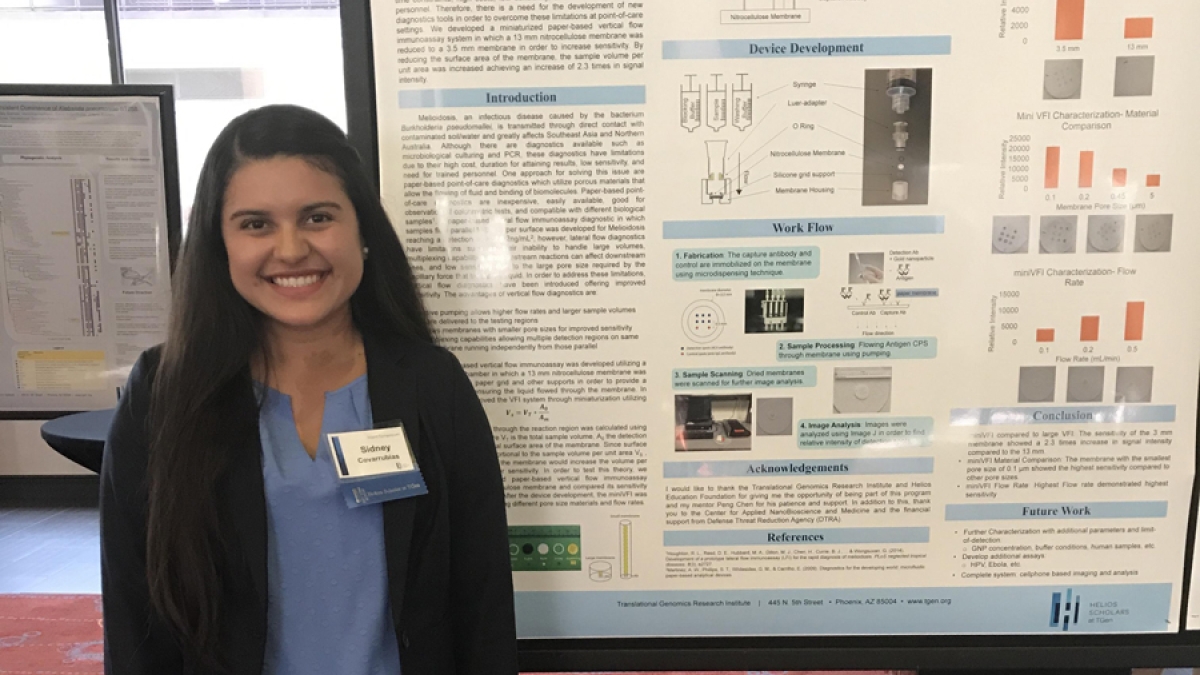
Sidney Covarrubias with her research presentation at 2017 TGen Symposium.
Three undergraduate biochemistry students from Arizona State University's School of Molecular Sciences presented at the Helios Scholars TGen 2017 Intern Symposium on July 28, showcasing their work in biomedical research over the summer.
Helios Scholars at TGen is an extremely prestigious eight-week summer internship program in biomedical research. Interns work full-time on a research project under the mentorship of a TGen (Translational Genomics Research Institute) scientist to study the genetic components of diabetes, neurological disease and cancer. Helios Scholars also attend educational seminars, learn about career options in bioscience and practice scientific writing and research presentation skills. As a capstone to the summer program, scholars present their project results and accomplishments while at TGen at a formal research symposium.
The program is open to high school, undergraduate, graduate and medical school students in Arizona. This summer’s 45 Helios Scholars were selected from more than 500 applicants based on factors such as academic ability, initiative, personal achievements and more.
School of Molecular Sciences students Sidney Covarrubias, Alex Follette and Victoria Oladoye all gave poster presentations highlighting their project results at the TGen 2017 Intern Symposium.
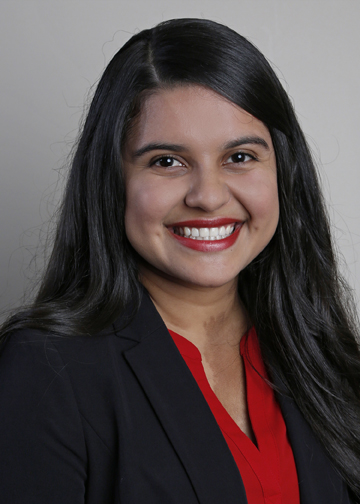
Helios Scholar Sidney Covarrubias
Covarrubias conducted research on the infectious disease Melioidosis as part of a project for the Center for Applied NanoBioscience and Medicine at the University of Arizona Phoenix campus.
“Melioidosis is a bacterium that has a mortality rate of 40 percent and affects areas in Southeast Asia and Northern Australia," she said. "Traditional diagnostics such as microbiological culturing and PCR have limitations such as time constraints, high costs, low sensitivity, and the need for trained personnel. Therefore, there is a need for the development of new diagnostics tools in order to overcome these limitations at point-of-care settings. We developed a miniaturized paper-based vertical flow immunoassay system in which a 13 mm nitrocellulose membrane was reduced to a 3.5 mm membrane in order to increase sensitivity and produce a device that accurately detected the disease.”
“This summer internship introduced me to all of the questions and processes that scientists face in their roles daily," Covarrubias said. "I learned to be patient with projects and to accept that science takes time due to the fact that multiple trials need to be consistent before one can move forward.”
Covarrubias said that the biggest thing that she gained from her experience as a Helios Scholar is the realization that medicine is truly her passion.
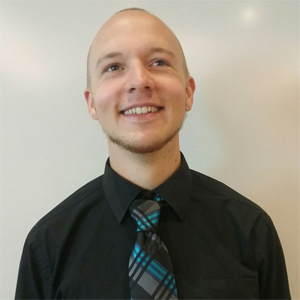
Helios Scholar Alex Follette
Alex Follette presented on the results of DNA sequencing of canine lung cancer.
“While smoking is a common cause of lung cancer, about 30,000 never-smoker lung cancer (NS-LC) diagnoses are made each year in the U.S.," Follette said. “NS-LC is relatively understudied and a great need exists for new NS-LC treatments and accelerated clinical trials. The canine is a powerful model for comparative oncology that can help meet the need for accelerated clinical trials of candidate treatments. Compared to transgenic mouse models in which tumors are artificially induced, canine cancers arise naturally and are histopathologically similar to human cancers. To better understand the role that dogs with naturally occurring lung cancer may play as a model NS-LC, we sought to characterize its genomic landscape.”
Asked what he gained from his experience, Follette said, “I learned a great amount of information and skills during the summer, including public speaking, presenting data and creating scientific posters. Furthermore, I learned a great deal of technical information, how to conduct research and the computational utilities used in laboratory research. It was a great experience and I highly recommend interested students to apply to the Helios Scholarship Program.”
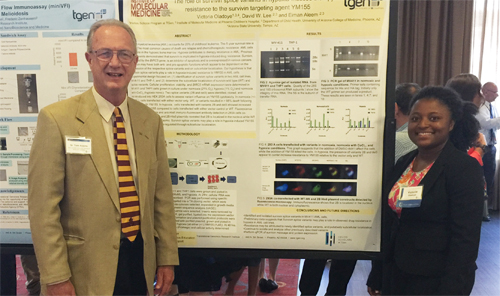
Victoria Oladoye (right) and Tom Avants with her research presentation at 2017 TGen Symposium.
Victoria Oladoye’s research was on childhood leukemia. Her poster session was titled, “The role of survivin splice variants in hypoxia-induced therapy resistance to the survivin targeting agent YM55.”
Tom Avants, senior academic adviser in the School of Molecular Sciences, attended the symposium and came away with great praise for the undergraduate presenters.
“As Victoria’s academic advisor, it was a joy to see the wonderful progress she has made as a student and first-class researcher," Avants said. "I remember meeting Victoria for the first time at freshman orientation. She has always been inquisitive, asking about minors, requesting overloads to 19 credit hours, always wanting to do more.”
Internships for the Helios Scholars at TGen program are available for undergraduate and graduate level-students in all areas of translational bioscience — including laboratory research, computer science and bioinformatics, mathematics and statistics, and research administration. To apply, visit www.tgen.org/home/education-outreach/helios-scholars-at-tge.
More Science and technology
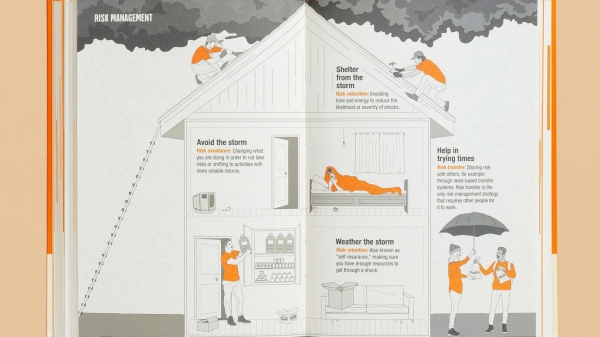
ASU author puts the fun in preparing for the apocalypse
The idea of an apocalypse was once only the stuff of science fiction — like in “Dawn of the Dead” or “I Am Legend.” However…
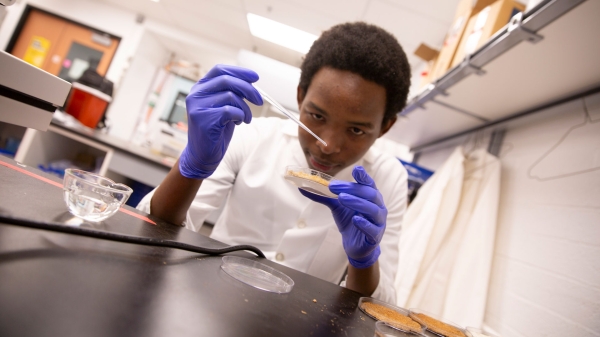
Meet student researchers solving real-world challenges
Developing sustainable solar energy solutions, deploying fungi to support soils affected by wildfire, making space education more…
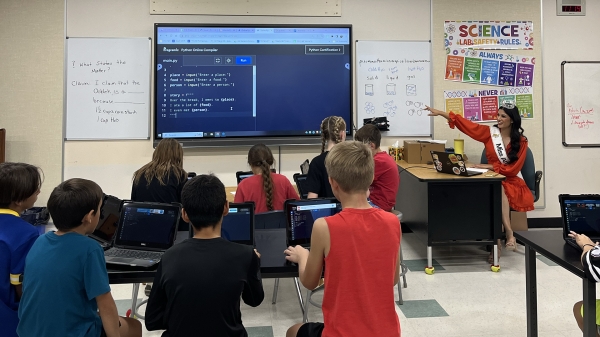
Miss Arizona, computer science major wants to inspire children to combine code and creativity
Editor’s note: This story is part of a series of profiles of notable spring 2024 graduates. “It’s bittersweet.” That’s how…